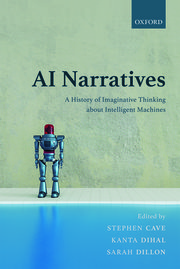
It never fails to be an exciting moment when a book that you have worked on for years finally meets the world. My co-edited book, AI Narratives: A History of Imaginative Thinking about Intelligent Machines, is now out with Oxford University Press. Mapping AI narratives from the classical era through through to the present, the collection examines how stories about AI anticipate, and can usefully inform, many contemporary debates about the social, ethical, political and philosophical consequences of AI. It was a pleasure to work with the contributors, from whom I learnt so much and who bring such a rich range of different expertise and methodological approaches to the topic.
CONTENTS
Introduction
Imagining AI, Stephen Cave, Kanta Dihal and Sarah Dillon
PART I – ANTIQUITY TO MODERNITY
1. Homer’s Intelligent Machines: AI in Antiquity, Genevieve Liveley and Sam Thomas
2. Demons and Devices: Artificial and Augmented Intelligence before AI, E. R. Truitt
3. The Android of Albertus Magnus: A Legend of Artificial Being, Minsoo Kang and Ben Halliburton
4. Artificial Slaves in the Renaissance and the Dangers of Independent Innovation, Kevin LaGrandeur
5. Making the Machine Speak: Hearing Artificial Voices in the Eighteenth Century, Julie Park
6. Victorian Fictions of Computational Creativity, Megan Ward
7. Machines Like Us? Modernism and the Question of the Robot, Paul March-Russell
PART II – MODERN AND CONTEMPORARY
8. Enslaved Minds: Artificial Intelligence, Slavery, and Revolt, Kanta Dihal
9. Machine Visions: Artificial Intelligence, Society, and Control, Will Slocombe
10. “A push-button type of thinking”: Automation, Cybernetics, and AI in Mid-century British Literature, Graham Matthews
11. Artificial Intelligence and the Parent/Child Narrative, Beth Singler
12. AI and Cyberpunk Networks, Anna McFarlane
13. AI: Artificial Immortality and Narratives of Mind-Uploading, Stephen Cave
14. Artificial Intelligence and the Sovereign-Governance Game, Sarah Dillon and Michael Dillon
15. The Measure of a Woman: Fembots, Fact and Fiction, Kate Devlin and Olivia Belton
16. The Fall and Rise of AI: Investigating AI Narratives with Computational Methods, Gabriel Recchia

